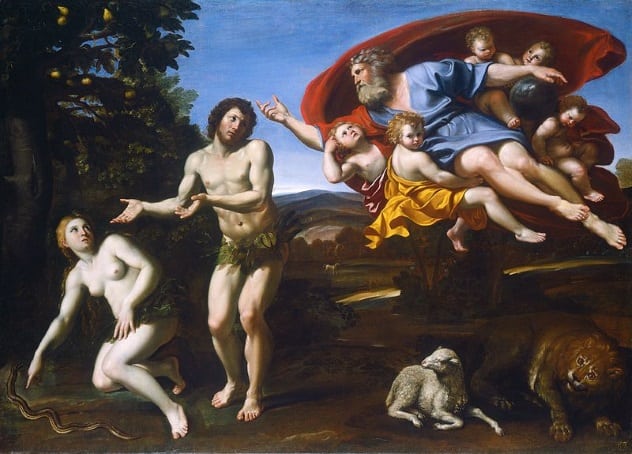 Miscellaneous
Miscellaneous  Miscellaneous
Miscellaneous  Politics
Politics 10 Lesser-Known Far-Right Groups of the 21st Century
 History
History Ten Revealing Facts about Daily Domestic Life in the Old West
 Weird Stuff
Weird Stuff 10 Everyday Products Surprisingly Made by Inmates
 Movies and TV
Movies and TV 10 Actors Dragged out of Retirement for One Key Role
 Creepy
Creepy 10 Lesser-Known Shapeshifter Legends from Around the World
 Animals
Animals 10 Amazing Animal Tales from the Ancient World
 Gaming
Gaming 10 Game Characters Everyone Hated Playing
 Books
Books 10 Famous Writers Who Were Hypocritical
 Humans
Humans 10 of the World’s Toughest Puzzles Solved in Record Time
 Miscellaneous
Miscellaneous 10 Ironic News Stories Straight out of an Alanis Morissette Song
 Politics
Politics 10 Lesser-Known Far-Right Groups of the 21st Century
 History
History Ten Revealing Facts about Daily Domestic Life in the Old West
Who's Behind Listverse?

Jamie Frater
Head Editor
Jamie founded Listverse due to an insatiable desire to share fascinating, obscure, and bizarre facts. He has been a guest speaker on numerous national radio and television stations and is a five time published author.
More About Us Weird Stuff
Weird Stuff 10 Everyday Products Surprisingly Made by Inmates
 Movies and TV
Movies and TV 10 Actors Dragged out of Retirement for One Key Role
 Creepy
Creepy 10 Lesser-Known Shapeshifter Legends from Around the World
 Animals
Animals 10 Amazing Animal Tales from the Ancient World
 Gaming
Gaming 10 Game Characters Everyone Hated Playing
 Books
Books 10 Famous Writers Who Were Hypocritical
 Humans
Humans 10 of the World’s Toughest Puzzles Solved in Record Time
10 Bible Verses That Were Changed In Translation
The word of the Holy Bible isn’t always as clear-cut as we’d like it to be. It didn’t fall from the sky, bound in leather, with every word in perfect English. Instead, it’s something countless scribes have spent thousands of years deciphering, working off age-old manuscripts that don’t always say the same things.
They don’t always get it right. Some of the best-known verses in the Bible have been mixed up, rewritten by translators, or even just snuck into the Good Book from scratch, pulled from nothing more than a scribe’s imagination.
And that can be a big deal. If you believe that the Bible is the word of God, every little detail matters. The slightest typo could completely change the way millions of people lead their lives.
10 ‘Let He Who Is Without Sin Cast The First Stone’

One of the best-known stories in the Bible may have been completely made up by a translator.
It’s the famous story of Jesus drawing a line in the sand between a woman and the Pharisees who wanted to stone her to death. In most Bibles, it shows up between John 7:53 and 8:11, and it gives us one of the most quoted lines in Christianity: “Let he who is without sin cast the first stone.” (How it’s exactly written varies between different versions.)
The thing is, the oldest copies of the Gospel of John don’t have that story. In fact, that story doesn’t show up anywhere, on anything, until the fifth century AD—about 400 years after Jesus died.
The first text to include this story is an old Greek and Latin translation of the Gospels called the Codex Bezae. That codex is notorious for slipping in the odd extra detail that doesn’t show up anywhere else. And this story, in particular, is worded in a way that some Biblical scholars say doesn’t quite sound like it was written by the same person who wrote the rest of the Book of John.[1]
A lot of people still argue it’s a true story, mostly on the basis that it sounds like the type of thing Jesus would do. There’s a lot of reason to believe, though, that the famous quote isn’t really the word of Jesus; it’s just something somebody slipped in four centuries later.
9 ‘Women Should Remain Silent In Churches’

1 Corinthians 14 contains a strange, seemingly random interjection of misogyny that interrupts what, without it, would be a cohesive thought. They usually show up as verses 34 and 35, and they read:
Women should remain silent in the churches. They are not allowed to speak, but must be in submission, as the law says. If they want to inquire about something, they should ask their own husbands at home; for it is disgraceful for a woman to speak in the church.
When you read it in context, it doesn’t make a ton of sense. The same chapter of the Bible calls on both “brothers and sisters” to “prophesy” and “speak in tongues,” and it seems to heavily imply that they’re supposed to be doing these things—none of which involve remaining silent—while they’re in church.[2]
There might a simple explanation, though. Some people think an early Christian scholar just got fed up with his wife and slipped a “stop asking me questions” verse into the Good Book.
A fourth-century manuscript of the Book of Corinthians has a little note penciled into the margins next to those verses, saying that they are a later addition that weren’t originally in the book. And in other early manuscripts, these verses show up in seemingly random different parts of the Bible.
It’s possible, though, that this line is legitimate and that modern readers are just trying to erase it. Because the other side of the argument is that, despite what that one note says, we can’t find a single manuscript that doesn’t contain these lines. And so, for now, most Bibles still leave it in.
8 The Lord’s Prayer

One day, Jesus’s disciples said to Him: “Lord, teach us to pray.” And Jesus replied: “When you pray, say this.”
And then He said something. We’re not completely sure what.
The Lord’s Prayer, somewhat ironically, is actually one of the parts of the Bible that’s seen the most changes through translation. There are a lot of lines in it that we aren’t 100-percent sure are the same as when they were first written down.
The line “thy kingdom come,” in some early versions of the Bible, read: “May Your Holy Spirit come upon us and purify us,” opening up the possibility that the line was rewritten by someone with an apocalypse obsession.
Even Pope Francis has complained about this one. He objects to the line “lead us not into temptation,” arguing that it should be translated “do not let us fall into temptation.” It’s just a few words, but it’s a big difference. The usual translation kind of makes God sound like a trickster out to ruin everybody’s lives.
And the whole last line—often called the “doxology”—was almost certainly added by a translator.[3] The line “For thine is the kingdom, and the power, and the glory, forever. Amen.” doesn’t appear in the earliest in manuscripts, leading a lot of Biblical scholars to think someone, somewhere along the line, slipped it in himself.
7 ‘The Strength Of A Unicorn’

There’s this weird part of the Bible where Moses suddenly starts talking about unicorns as if they’re just gallivanting all over the place. It’s Numbers 23:22, and it reads: “God brought them out of Egypt; he hath as it were the strength of a unicorn.”
It’s one of the main reason the idea of unicorns is still so popular today—after all, they’re in the Bible. But not everybody agrees that the original Hebrew word, re’em, means “unicorn.”
Re’em means “single-horned creature,” but it’s more of a genus than a species. It’s a broad word that could refer to just about any horned creature, including rhinoceroses, wild oxen, wild buffalo, and oryxes.
The King James Version of the Bible still says “unicorn,” but those other animals have shown up in other translations. Today, most Bibles just call it a “wild ox.”[4]
By now, though, the unicorn has been firmly made a part of our mythological fantasies—and all because of a poor choice in translation.
6 ‘A Sodomite Of The Sons Of Israel’

Deuteronomy 23:17-18 seems to be an outright condemnation of homosexuality. It reads:
There shall be no whore of the daughters of Israel, nor a sodomite of the sons of Israel. Thou shalt not bring the hire of a whore, or the price of a dog, into the house of the Lord thy God for any vow: for even both these are abominations unto the Lord thy God.
It seems pretty clear-cut—if it’s translated correctly, anyway. But a lot of people think that it isn’t.
The word “sodomite” here doesn’t really seem to fit the context, and there’s a reason for that. The original word has a meaning that’s actually closer to “male prostitute,” and it doesn’t really have any connection to homosexuality.[5]
In the original Hebrew, the whole verse seems much more clearly to be a condemnation of prostitution for either gender, instead of specifically being an attack on male homosexuals. Someone translating the King James Version just decided to throw the word “sodomite” in.
5 ‘And These Three Are One’

When someone denies that Jesus and God are the same being, the easiest verse to prove them wrong is 1 John 5:7-8. In the King James Version, it reads:
For there are three that bear record in heaven, the Father, the Word, and the Holy Ghost: and these three are one. And there are three that bear witness in earth, the Spirit, and the water, and the blood: and these three agree in one.
It’s a clear, unambiguous declaration that God, Jesus, and the Holy Spirit are one and the same. Except, the thing is, it isn’t actually part of the Bible.[6]
In the oldest manuscripts, the verses are a lot shorter. They just say, “There are three that testify: the Spirit and the water and the blood, and these three agree,” without any references to the Trinity.
All those extra lines don’t show up until the fourth century—which, coincidentally, happens to be when the Catholic Church officially approved what’s known as the Trinity doctrine: the idea that God, Jesus, and the Holy Ghost are one.
Most Biblical scholars think this line was reworked in by some fourth-century priest who wanted to make sure nobody could prove his “Trinity” wrong—and it stayed in the Bible for more than 1,000 years.
4 ‘The Fool Who Says There Is No God’

Psalm 14 is a song about atheism. It talks about the “fool” who says, “There is no God,” and it criticizes them as selfish, corrupt people who focus on their own narcissistic interests while leaving the poor to starve.
Depending on the copy of the Bible you have, though, it can go a lot further than that. In some the earlier English translations of the Bible, the song gets really harsh:
Their mouth is full of cursing and bitterness, their feet are swift to shed blood. Destruction and unhappiness is in their ways, and the way of peace have they not known.
It’s a pretty big leap to go from “you evildoers frustrate the plans of the poor,” which just says atheists are kind of insensitive, to “their feet are swift to shed blood.” Some early Biblical translator, though, apparently thought the song wasn’t harsh enough, so he slipped in some accusations that atheists go around straight-up murdering people.
None of this is in the original manuscripts.[7] The original Psalm is just a call to take care of the less fortunate. The Bible doesn’t really say atheists are secretly plotting your death.
3 ‘Prayer And Fasting’

After Jesus cast the demons out of an epileptic man, His disciples asked Him how He’d done it. And Jesus told them, in Mark 9:29 (and Matthew 17:21): “This kind does not come out except by prayer and fasting.”
Or maybe just “prayer.” We’re not completely sure.
The thing is that we don’t actually have a copy of whatever it is the Apostle Mark actually wrote. All we have are copies that other people made a hundred years or so later, and some of them say “prayer and fasting,” while others just say “prayer.”[8]
The oldest one we can find only says “prayer,” so some people think that the word “fasting” was added by a scribe, but we can’t really know for sure. It’s perfectly possible that the person who wrote the oldest one just accidentally left a word out and the other scribes got it right.
It’s just one word, but it’s a big difference. It might be that Jesus commanded all of His followers to show their faith through fasting—or a lot of people might be trying to fast demons away for no reason, all because of translation error.
2 ‘Her Firstborn Son’

Matthew 1:25 declares that Jesus is Mary’s “firstborn son”—in some translations of the Bible, anyway. In others, it just calls Him “a son.” And, if you’re Catholic, that one word makes a big difference.
A lot of Catholics subscribe to the idea that Mary remained a virgin throughout her entire life, even after she gave birth to Jesus. That’s probably why a lot of Catholic Bibles translate that line to “a son”—because they reject the idea that Jesus had siblings.
It’s a tricky position to defend, since there are a couple of parts in the Bible where Jesus actually meets up with siblings and talks to them, but some Catholics argue that those stories are translation errors, too. The original Greek manuscripts use the word adelphos to refer to Jesus’s siblings, which could mean “cousin” instead of “brother.”[9]
Pretty well all of the oldest manuscripts of the book of Matthew, though, clearly use the words “firstborn son” instead of “a son.” A lot of people believe that word “firstborn” was deliberately taken out by people who wanted to think of Mary as a lifelong virgin, deliberately changing the Bible so that it fit what they wanted it to say.
1 ‘Your Desire Shall Be Contrary To Your Husband’

In 2016, a group of scholars put together what they called the “permanent” English Standard Version of the Bible. This, they advertised, was the “unchanging Word of God,” with every word translated so flawlessly that nothing would ever need to be changed.
Readers barely had to turn the first page, though, before they noticed a huge error. Genesis 3:16, when God curses Eve, usually reads: “Thy desire shall be to thy husband, and he shall rule over thee.” But in the new ESV translation, it read: “Your desire shall be contrary to your husband, but he shall rule over you.”
It’s a little different from the original. Like, for one, it says the exact opposite thing.
The ESV translation suggests that God cursed women to be in horrible marriages for all of eternity, constantly having their every desire squashed by a husband who doesn’t share a single one of their interests.[10]
The translators stand by their decision, despite widespread disapproval. And it makes a difference. Their translation tells women around the world that they shouldn’t expect ever to be in happy marriages and that they should settle for men who squash their every dream.
And by binding their own words up with the label “The Holy Bible,” the translators are telling women that this is the word of God.
Read more about the contested aspects of the Christian Bible on 10 Controversies That Could Change How We View The Bible and 10 Bible Passages That Might Be Totally Bogus.








